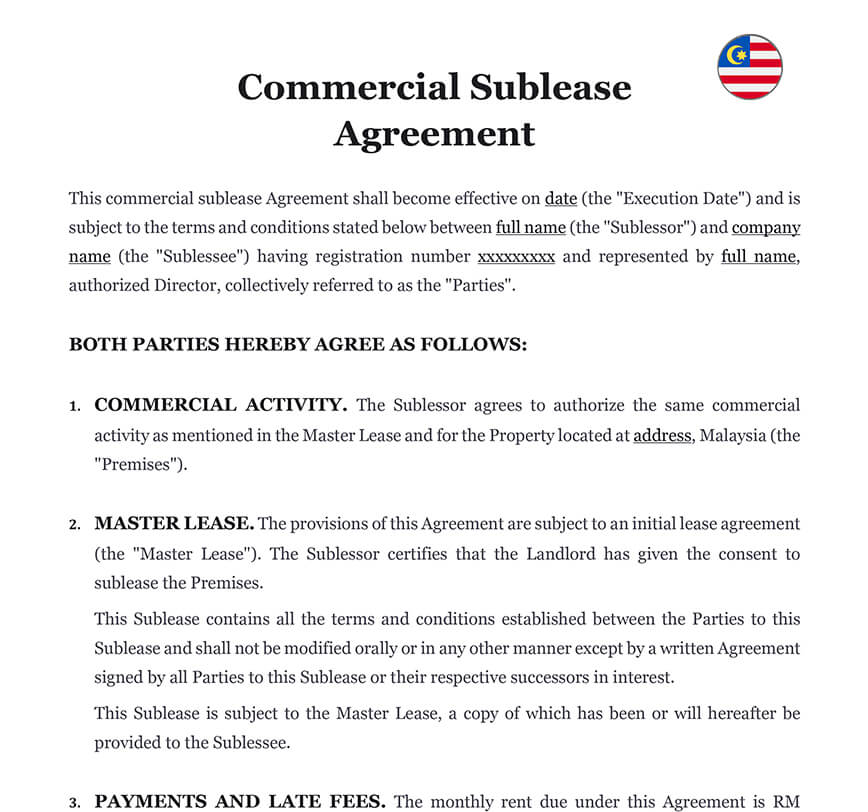Ready to use legal template
Drafted by experienced lawyers
Compliant with Hong Kong law
Ready to use legal template
Drafted by lawyers
Compliant with Hong Kong law
Home › Rent your property › Commercial sublease agreement
Learn more about Commercial Sublease Agreement in Hong Kong
A Commercial Sublease Agreement is a legally binding contract that allows a tenant (Sublandlord) to rent out part or all of a leased commercial property to another party (Subtenant) while still being responsible for the original lease obligations. This agreement is essential for businesses looking to optimize office space, reduce rental costs, or share premises with a partner. In Hong Kong, subleasing commercial property requires landlord consent and compliance with the terms of the Master Lease to avoid potential legal disputes. A well-drafted sublease agreement ensures clear terms on rent, duration, maintenance responsibilities, and dispute resolution, protecting both parties’ interests. Download our Commercial Sublease Agreement template, professionally drafted by lawyers and fully compliant with Hong Kong tenancy laws. Available in an easy-to-edit Word format, it provides a straightforward solution for secure and compliant subleasing.
Table of contents
-
-
What is a Commercial Sublease Agreement in Hong Kong?
-
What is included in this Commercial Sublease Agreement?
-
Is landlord consent required for a Commercial Sublease Agreement in Hong Kong?
-
Can a Commercial Sublease Agreement be transferred to another business?
-
Who is responsible for rent and damages in a commercial subletting agreement?
-
What are the legal obligations of a sublandlord in a commercial sublease?
-
How can a Commercial Sublease Agreement be legally terminated in Hong Kong?
-
What happens if the primary tenant breaches the Master Lease in a sublease?
-
Does a Commercial Sublease Agreement need to be registered in Hong Kong?
-
What is a Commercial Sublease Agreement in Hong Kong?
A Commercial Sublease Agreement in Hong Kong is a legally binding contract that enables a tenant referred to as the sublessor to lease all or part of their rented commercial space to another party, known as the sublessee. This arrangement is commonly used when the primary tenant no longer needs the full space or wishes to share it to reduce rental costs. The sublease operates under the authority of the original lease known as the Master Lease signed between the landlord and the sublessor. As a result, the sublessee must comply not only with the terms set out in the sublease but also with the obligations and restrictions defined in the Master Lease. Any violation by the sublessee could place the sublessor at risk of breaching their agreement with the landlord. Therefore, clear communication, proper documentation, and landlord approval are essential in commercial subleasing.
ℹ️ Protect your business interests with a well-drafted Commercial Lease Agreement for your property.
What is included in the Commercial Sublease Agreement?
| ➤ Commercial Activity: The Sublessor permits the Sublessee to conduct the same commercial activities as allowed in the Master Lease within the subleased premises in Hong Kong. |
| ➤ Master Lease : This Sublease Agreement is subject to the terms of the original lease (Master Lease), and the Sublessor confirms that the Landlord has consented to the sublease. |
| ➤ Payments And lates Fees: DThe Sublessee must pay monthly rent in full by the agreed due date; late payments will incur interest or penalties as specified in the Agreement. |
| ➤ Security Deposit: The Sublessee must pay a security deposit (typically equivalent to two months’ rent) upon signing, which will be refunded within 30 days of lease termination, minus any deductions for damages or unpaid dues. |
| ➤ Use Of Premises: The Sublessee may only use the premises for commercial purposes as permitted in the Master Lease and must comply with all relevant legal and regulatory requirements in Hong Kong. |
| ➤ Utilities And Services: The Sublessee is responsible for all utility payments (electricity, water, gas, etc.) during the sublease term unless otherwise agreed. |
| ➤ Repair and Maintenance: The Sublessee must maintain the premises in good condition and will be liable for any damage beyond normal wear and tear, ensuring compliance with Hong Kong’s tenancy regulations. |
| ➤ Taxes: The Sublessee must bear all applicable taxes and fees related to the commercial use of the premises, including any government-imposed charges under Hong Kong law. |
| ➤ Dispute Resolutions: Both parties agree to resolve disputes in good faith through negotiation before resorting to legal action. Mediation or arbitration may be used as per Hong Kong law. |
| ➤ Governing Law And jurisdiction: This Agreement is governed by the laws of Hong Kong, and any disputes shall be settled in the courts of Hong Kong. |




